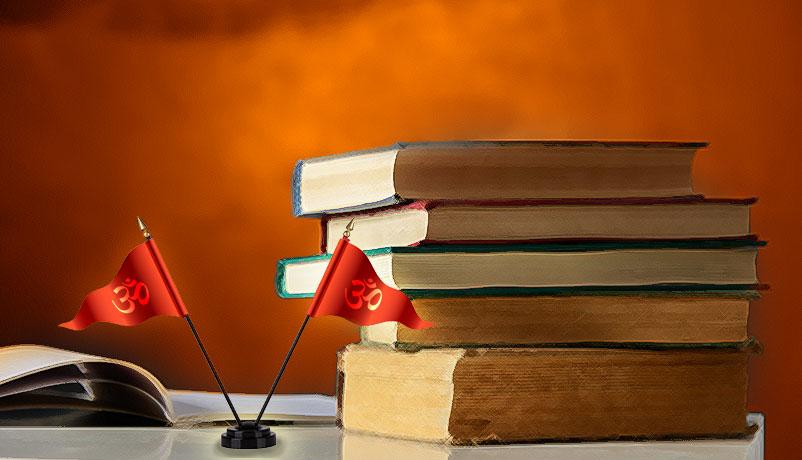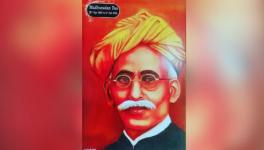Scissors in Hand, RSS Tears Into Textbooks Again

Covid-19 has created havoc all around the world, but some regimes have used it to curtail democratic freedoms. In some countries, this is leading to a backlash. For instance, an ongoing campaign in the United States opposes the “stifling” cultural climate and deliberate weakening of platforms that should be fostering “open debate”. In India as well, the intimidation of protesters and popular movements has intensified as has the backlash. But the sectarian forces are still deploying the Covid-19 pandemic as they know best. First they used it to harangue the Muslim community. And now, in the name of reducing the “burden” of education, core ideas that have shaped the Indian identity are being deleted from text books.
Chapters on federalism, citizenship, nationalism, secularism, human rights, legal aid and local self government are being expunged from courses. This much is known. It is also no mystery why education is a key target of the communal forces. After all, these forces have constantly complained that “Leftists” have dominated the framing of curricula in India and that the views of “Macaulay, Marx and Mohammad” are being propagated in schools, and that therefore the courses need to be “Indianised”.
However, what they do not talk about is the impact on education of the first Bharatiya Janata Party (BJP) regime. When the BJP formed the first National Democratic Alliance government at the Centre in 1998, with Murli Manohar Joshi as minister of human resources, the government only saffronised education. Their so-called Indianisation turned out to a dumbing down of the social sciences, in particular of history. In the BJP’s point of view, astrology and Sanskrit shlokas divorced from context are Indianisation. It introduced both in the school curriculum. It also introduced chapters defending the caste system and uncritical (in fact gloating) paragraphs on a nationalism of the kind that was espoused by Hitler.
After the NDA lost the national election in 2004, the Congress-led United Progressive Alliance attempted to rectify these distortions. But after the 2014 election, the BJP returned to power and the same chaos has ensued. The affiliates of the Rashtriya Swayamsevak Sangh, the parent body of the BJP, are active in the filed of education again. They have been interacting with officials in the ministry of human resources to change the curriculum to match their Hindu nationalist agenda.
The Shiksha Sanskriti Utthan Nyas and other such organisations have been demanding the removal of English and Urdu words from texts. They want the ideas of Rabindranath Tagore on nationalism removed. They want extracts from the autobiography of MF Husain, the world-renown artist who died in exile after Hindutva forces pushed him out of the country, deleted. References to the benevolence of Muslim rulers, even references to the BJP as a party espousing the cause of Hindus and the apology tendered by Congress leader and former prime minister Manmohan Singh for the anti-Sikh pogrom of 1984, are a target of the BJP’s censorship. The same goes for any reference to the Gujarat carnage of 2002—they are to be removed and this is what the BJP is calling the “Bharatiykaran” or Indianisation of school syllabi.
The multiheaded hydra that is the RSS has a pracharak named Dinanath Batra who has set up a Shiksha Bachao Abhiyan Samiti which has been pressurising publishers to drop the books that do not conform to the RSS’ point of view. The infamous withdrawal of Wendy Doniger’s book, The Hindus, is a case in point. According to the RSS, Dongier’s book does not represent ancient India as she “should”, for she has looked at events from a subaltern perspective.
In the meantime, Batra, who is part of the Vidya Bharti offshoot of the Sangh Parivar, has released nine books for school students which provide the RSS’ view of the past and the RSS’ understanding of social sciences. These have been translated into Gujarati and are being taught to students in the western state, including upper-primary students since July 2014. They are full of pro-“Aryan” and anti-“western” ideas. “The student that goes to an RSS shakha daily, he finds miraculous change in his life,” Batra writes in one of his books, Shikshan ma Triveni.
Now comes the recent decision to simply delete parts of the curriculum—those parts which provide a basic grounding on Indian nationalism, secularism and human rights. These topics have always been anathema to Hindu nationalists, and over the last few years they have grown increasingly uncomfortable with the fact that they exist. After all, the RSS and its affiliates and supporters have been defaming secularism throughout their recent terms in power, as they did when they were not in power. So opposed are they to secularism that the RSS removed the reference to it in the Preamble of the Constitution in the advertisement they released to the public on the eve of Republic Day, 2015.
Ever since the Ram temple movement began a few decades ago, the secular ethos of India’s freedom movement and the secular values of the Constitution have been constantly criticised by the Hindutva forces. Many an RSS ideologue and BJP leader has demanded the Constitution to be re-written for the reason that it espouses freedom of conscience and equality to all.
The fact is that secularism is indistinguishable from Indian nationalism and the nationalist movement for freedom. This is something the Hindutva forces refuse to accept or even acknowledge. In the name of religious nationalism, they are pursuing a sectarian and divisive idea of the nation. To make this vision reality they have been attacking student leaders in particular, in the hopes to weaken those who uphold the Constitution. The very genesis of Indian nationalism tells us of the plurality of our anti-colonial movement. Both the Muslim and Hindu communalists stayed aloof from India’s freedom struggle. For this reason, the anti-colonial struggle which built the Indian nation pursued the idea of a diverse nation.
Similarly, because India’s Constitution accords equal rights to all citizens, the chapters on citizenship are being dropped. Federalism has been at the core of India’s administrative and political structures. As the dictatorial tendencies are becoming stronger, federalism is bound to suffer and that explains why this subject is also being dropped. Democracy means the decentralisation of power; it means that power must reach the most remote part of the system, its villages and every citizen. This is what the constitutional amendments that enshrined local self government as the most basic unit of power and control over resources set out to achieve. Power in India has been distributed among villages, cities, states and the Center. By removing the teaching of federalism and local self government, the ruling party has only put on display its centralising tendency.
The dropping of human rights needs our special attention. The concept of human rights and human dignity are interlinked. Diluting these provisions also has international ramifications, for India is a signatory to United Nations covenants on human rights. Removing the study of human rights at the school level gives a clear indication that from now on “rights” are the preserve of a few elites, while the citizenry and the deprived sections will get “duties” in their share.
The government is using this Coronavirus-gifted opportunity to pursue the ruling party’s agenda in the arena of education. Only those parts of the curriculum are being removed which the BJP is uncomfortable with. The omissions supplement its commissions in realpolitik. All the changes are what its parent body, the RSS and its affiliates, want carried out. The epics Ramayana and Mahabharata are history for the RSS. What will get pride of place in the school text books planned by the communal forces are fantasies. How India had mastered stem cell technology, how plastic surgery created Ganesha, how the aviation sector boomed during the age of pushpaka vimanas, and so on, and other degradations of both India’s history and mythology.
The author is a social activist and commentator. The views are personal.
Get the latest reports & analysis with people's perspective on Protests, movements & deep analytical videos, discussions of the current affairs in your Telegram app. Subscribe to NewsClick's Telegram channel & get Real-Time updates on stories, as they get published on our website.
























